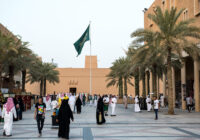Anger at President Trump’s move on Jerusalem could potentially turn against Arab leaders.
Donald Trump’s recognition of Jerusalem as the capital of Israel potentially sets the stage for a controversial American effort — backed by Saudi Arabia and the United Arab Emirates — to resolve the Israeli-Palestinian conflict. The US and the two Gulf states see an American peace plan-in-the-making as a way for more overt cooperation with Israel in confronting Iran, whom they accuse of destabilizing the Middle East.
In doing so, the US, Saudi Arabia and the UAE are navigating a minefield. Protests against President Trump’s move have, so far, underplayed the link between the fight against Iran and apparent Saudi and Emirati willingness to compromise on minimal Palestinian demands for peace, which include East Jerusalem as the capital of a future Palestinian state.
Abu Dis, Capital of Palestine?
That could change as US plans for Israeli-Palestinian peace crystalize and the link to the Saudi-Iranian rivalry manifests itself. According to a Lebanese official, at the core of the US draft plan is the controversial suggestion that Abu Dis — a Palestinian village bordering Jerusalem — would be the capital of a future Palestinian state, instead of East Jerusalem.
Perceived Saudi and Emirati backing for the proposal, which is reportedly being drafted by Trump’s aide and son-in-law, Jared Kushner, would bring anger at alleged Arab complicity to the forefront, fuel the persistent anti-US and anti-Israel protests, and complicate the campaign by the US and the two Gulf states against Iran.
The notion that Abu Dis could replace East Jerusalem has been around for almost two decades. It failed to garner support during the 2000 Camp David peace talks because Arab and Palestinian leaders rejected it. Saudi and Emirati eagerness to work with Israel, coupled with Trump’s seemingly unqualified support for the Jewish state, has given the proposal a new lease on life.
Saudi Arabia and the UAE, despite their official condemnation of Trump’s recognition of Jerusalem, have signaled a willingness to be more flexible by continuing to support Kushner’s effort and playing a low-key, if not dampening, role in Arab and Muslim rejection of the president’s move.
Ironically, differences among Arab leaders about how to respond to Trump’s Jerusalem comments may have temporarily prevented Saudi Crown Prince Mohammed bin Salman from adding Palestine to a string of failed foreign policy moves aimed at escalating the kingdom’s proxy war with Iran. Prince Mohammed’s devastating military intervention in Yemen, his botched effort to force Lebanese Prime Minister Saad Hariri to resign, and his hamstrung boycott of Qatar have backfired and only strengthened the Islamic Republic’s regional influence.
Inadvertently, Palestinian President Mahmoud Abbas and Jordanian King Abdullah did Prince Mohammed a favor when they reportedly rejected pressure by the crown prince to not participate in the Organisation of Islamic Cooperation (OIC) summit in Istanbul. Saudi Arabia was represented by a lower level cabinet official. Abbas may have further shielded the Saudi leader when his refusal to accept the US as a mediator was adopted by the summit.
 The stand by Abbas and King Abdullah, coupled with the OIC summit’s rejection of Trump’s move, make it more difficult for Saudi Arabia and the UAE to endorse any resolution of the Israeli-Palestinian conflict that does not recognize East Jerusalem as the capital of Palestine. The problem is that Prince Mohammed and his UAE counterpart, Prince Mohammed bin Zayed, run the risk of misreading or underestimating public anger and frustration in significant parts of the Arab and Muslim world.
The stand by Abbas and King Abdullah, coupled with the OIC summit’s rejection of Trump’s move, make it more difficult for Saudi Arabia and the UAE to endorse any resolution of the Israeli-Palestinian conflict that does not recognize East Jerusalem as the capital of Palestine. The problem is that Prince Mohammed and his UAE counterpart, Prince Mohammed bin Zayed, run the risk of misreading or underestimating public anger and frustration in significant parts of the Arab and Muslim world.
The Iran Deal
The link between Israeli-Palestinian peace-making and Iran is likely to become undeniable in January 2018, when Trump must decide whether to uphold the 2015 international nuclear agreement with Iran, which puts severe restrictions on its nuclear program in exchange for the lifting of sanctions. Under US law, Trump has to certify Iranian compliance every three months. In October, the president refused to do so. He threatened to pull out of the deal if Congress failed to address the agreement’s perceived shortcomings within 60 days.
Congress has so far refrained from acting on Trump’s demand. The president wants Congress to ensure that Iranian compliance involves accepting restrictions on its ballistic missile program and support of regional proxies.
It is anybody’s guess what Trump will do.
At first glance, US Ambassador to the United Nations Nikki Haley’s presentation of Iranian missile parts as evidence of Tehran’s support for Houthi rebels in Yemen — and wider Iranian destabilization of the Middle East — would suggest that Trump is preparing to decertify Iran and possibly withdraw from the agreement. It could, however, also be an effort to project a tougher US stance toward Iran, while cooler heads in the administration put pressure on Trump to keep the agreement in place.
In either case, Trump and his Gulf allies are walking a tightrope by fueling suspicion that they are willing to compromise on minimal Palestinian demands for peace in a bid to cater to Israel, a natural ally in the fight against Iran. In doing so, Trump and the two Gulf princes risk misreading not only the public mood, but also Iranian influence and intentions, particularly regarding the Islamic Republic’s ability to control the Houthi rebels in Yemen. Haley’s evidence, which was supplied by Saudi Arabia and the UAE, failed to convince many in the international community.
Haley’s display of missiles was prompted by the Iranian-backed Houthis who fired a ballistic missile at Riyadh, the Saudi capital, on November 4. It remains unclear whether that missile was supplied by Iran, or possibly North Korea, and when it was given to the Houthis. These are key questions that need to be answered to determine possible Iranian culpability.
The Houthis, a fiercely independent actor who have repeatedly demonstrated that they do not take orders from Tehran and at times ignore its advice, could throw a monkey wrench into the fragile Middle East mix if they make good on a threat to target not only Saudi, but also Emirati cities. A missile strike would no doubt provoke a harsh response, possibly involving a joint American-Saudi-Emirati strike against Iran rather than the Houthis in Yemen.
Anger at President Trump’s move on Jerusalem could potentially turn against Arab leaders, who would be seen to be cooperating with the US and willing to sacrifice Palestinian rights to work with Israel.
In short, it could open a can of worms in which public anger is directed against multiple parties, ranging from the US to Israel to Arab leaders to Iran and the Houthis, and/or prove to be a perfect storm.
The views expressed in this article are the author’s own and do not necessarily reflect Fair Observer’s editorial policy.
Photo Credit: Kyrylo Glivin / Shutterstock.com
Support Fair Observer
We rely on your support for our independence, diversity and quality.
For more than 10 years, Fair Observer has been free, fair and independent. No billionaire owns us, no advertisers control us. We are a reader-supported nonprofit. Unlike many other publications, we keep our content free for readers regardless of where they live or whether they can afford to pay. We have no paywalls and no ads.
In the post-truth era of fake news, echo chambers and filter bubbles, we publish a plurality of perspectives from around the world. Anyone can publish with us, but everyone goes through a rigorous editorial process. So, you get fact-checked, well-reasoned content instead of noise.
We publish 2,500+ voices from 90+ countries. We also conduct education and training programs
on subjects ranging from digital media and journalism to writing and critical thinking. This
doesn’t come cheap. Servers, editors, trainers and web developers cost
money.
Please consider supporting us on a regular basis as a recurring donor or a
sustaining member.
Will you support FO’s journalism?
We rely on your support for our independence, diversity and quality.






